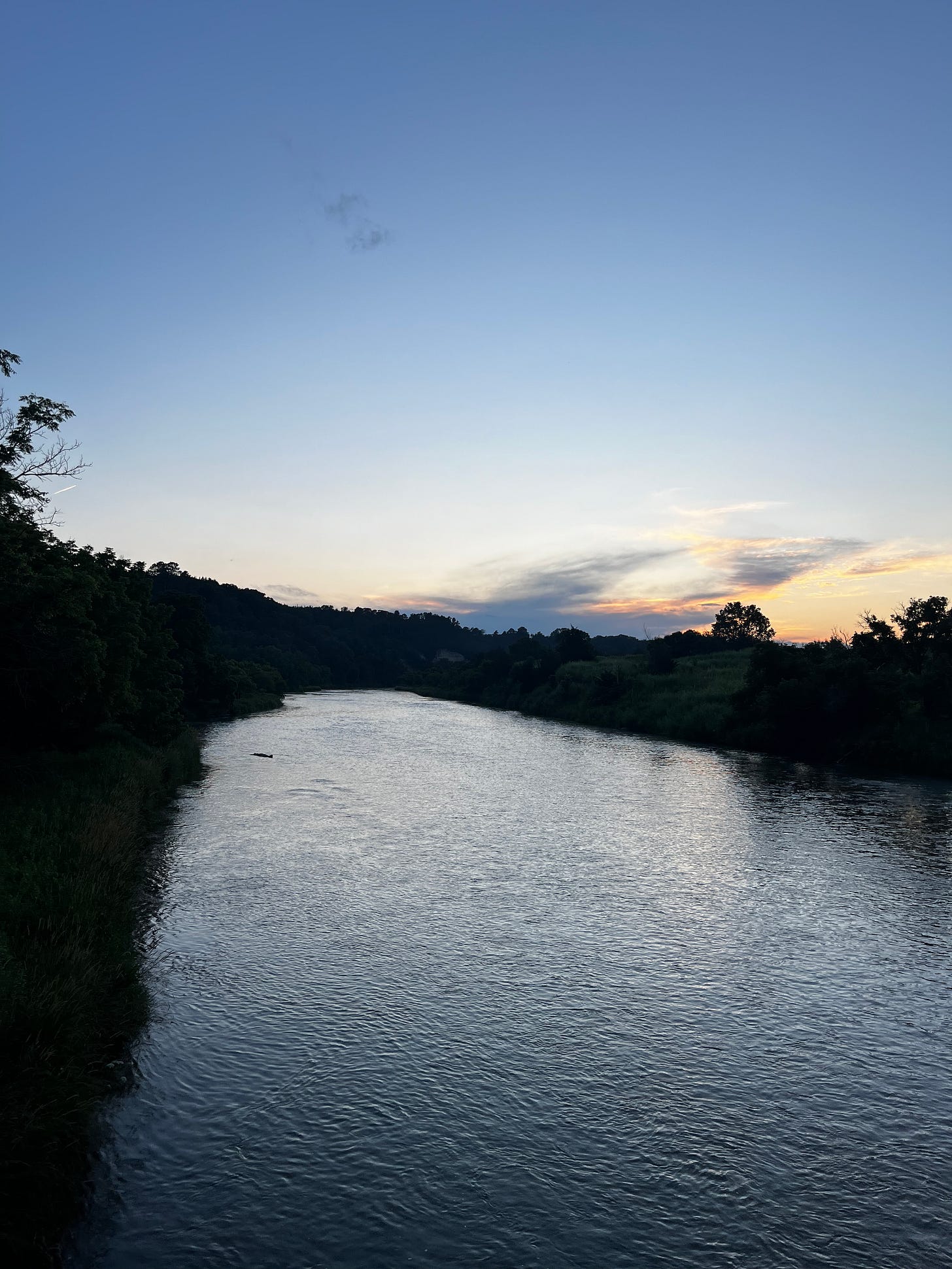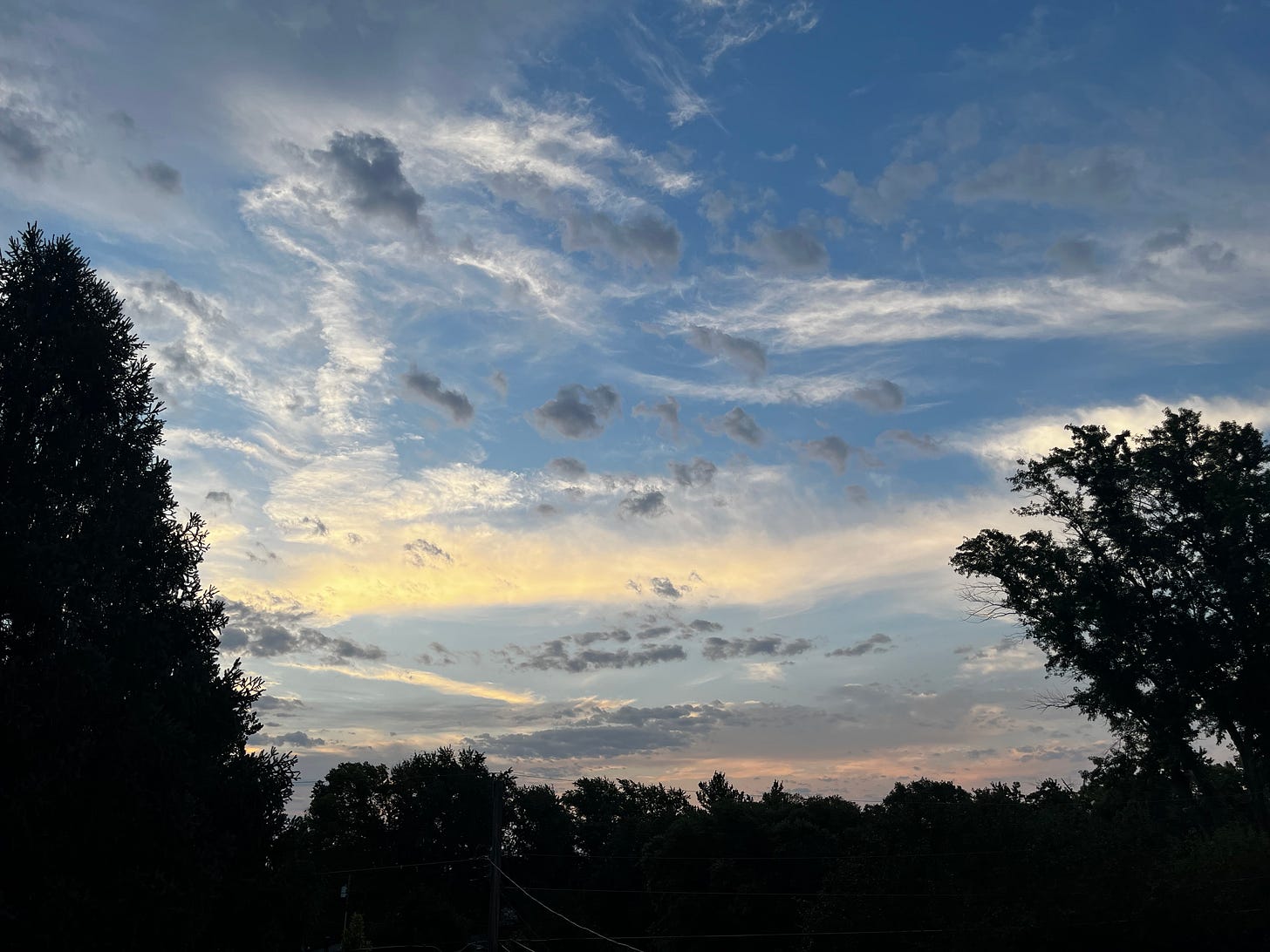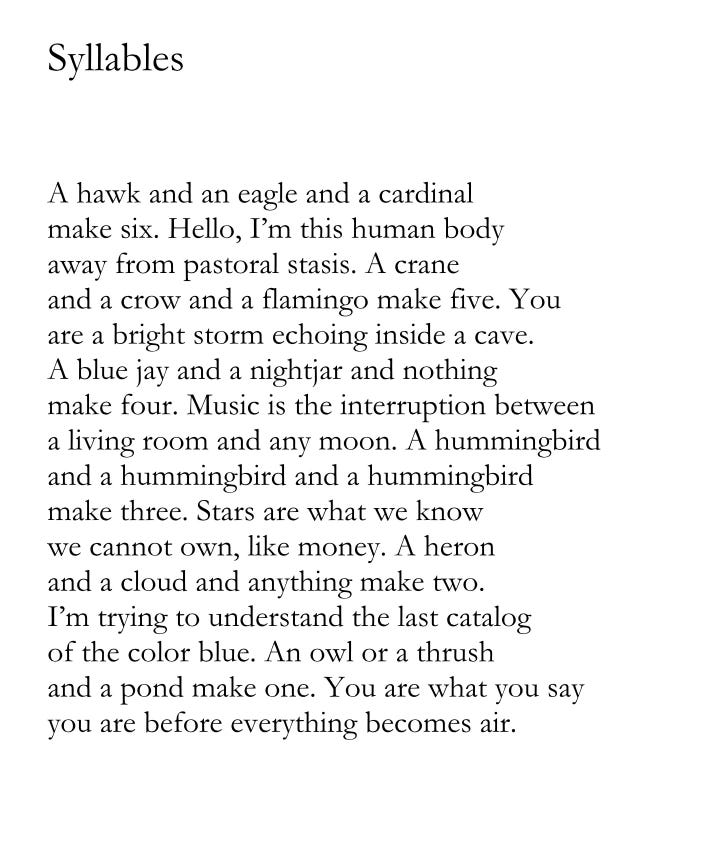Wow & Flutter 014 | Autoblivion
Poet Trey Moody on childhood mix tapes, Tower Records, sound in poetry, and feeling alone while connected
I met Trey by accident over a poem about the moon. (You can listen to Against Distance, read by Trey, here.) Possibly low-hanging fruit in the world of poetry (the moon), and yet something about the plain, internet-meme-tinged opener of “I don’t know who needs to hear this—” grabbed me. True to my interactions conversing with Trey, there will be a gut-punch closer you didn’t expect. “I’ve heard grief is only love with nowhere to go”.
Somewhere in Omaha, in the middle, a person able to swiftly move between life’s comedy and life’s tragedies, and perfectly describe it. This interview deviates from our regular content— with physical media situated at the background as a vehicle for memory.
Wow & Flutter: Hi Trey, tell us where you're writing from and where you pick up your records and books.
Trey Moody: Howdy, Carolyn! Writing from September-warm Omaha, Nebraska, home of the great used stacks at Jackson Street Books and the independent gem The Bookworm. For sounds, the pinnacle of Omahatown is Simon Joyner’s Grapefruit Records.
W&F: When you introduce yourself at parties does anyone believe you're actually a poet? Are you then pressured to write poems for anyone you have a relationship with?
TM: At least in Omaha, pretty much everyone I meet at parties is already friends of a friend, and the odds are high that friend in common is a writer or artist. Likely because of this, the veracity of my being-a-poet claim isn’t ever really challenged, at least on the surface, but I’m not sure I often really lead with the fact that I’m a poet, either. I come from a family of folks who are adamantly not artists, so I probably harbor a little internal awkwardness about being one from when I was figuring stuff out and testing it against my family upbringing. Especially if I don’t already somehow know or suspect that you’re an artist, too, I’m much more likely to tell you that I teach, or that I have a dog named Lily, or that my daughter just started seventh grade. And as to the second question, I, too, suspected demands from romantic partners for poems written about them, but that’s never happened. This is likely due to the kinds of poems I tend to write (or not write) more than anything. But I have occasionally written those poems, just on my originating terms.
W&F: Something we have in common is growing up in Texas about the same time in the 1990s— so what were the first cassettes you picked up? Did you get them at the mall?
TM: We were like three hours away from each other! Was there a Tower Records in Houston? There wasn’t in San Antonio, but I always felt so cool when I’d go to Austin with my family and dip in for a bit. One of my first tapes was this hip-hop group Onyx’s debut Bacdafucup—I was going to say “this hip-hop group nobody remembers called Onyx,” but I just searched them and they’re still around. In the 90s everyone knew their song “Slam,” and based on their upcoming tour, it looks like the good people of Europe remain transfixed. My other first tape, which I probably bought at the same time, was The Smashing Pumpkins, Mellon Collie and the Infinite Sadness. Oh, how I loved that two-tape set. One of the first songs my cousin taught me to play, before I was even a guitar player, was “Disarm,” so by the time I was buying my own albums, I was VERY excited for their third release. I haven’t listened to the complete album in at least a decade, but just the other week I was utterly stilled somewhere in public when “1979” came on. What’s hilarious thinking back to middle-school me is how I’d have to fast forward all the way to track six (!) for “Bullet with Butterfly Wings.” The way my daughter and her friends now instantly skip to track six—or even skip to the OTHER album entirely, or whatever-the-hell-they-want-anywhere-and-from-any-time-in-recorded-history? Exit my tactile lawn, please. Also interesting is that I purchased these cassettes—probably the only I purchased myself before switching to compact discs—at Blockbuster Music. For those who don’t know, Blockbuster Music was a mythical place, let me tell you. You could walk right in and ask any employee to open any CD for you to listen to at their Walkman bar, which of course I only did once or twice because I felt bad asking for such a big lift. That business enterprise failed pretty quickly, it seems.
W&F: Do you remember making mixtapes as a kid? How did you make them and what were you putting on them?
TM: Oh yes I do. I remember making mixtapes for friends—a little Green Day, The Offspring, No Doubt. But I particularly remember making at least one mixtape for my middle-school girlfriend as part of some sort of mixtape exchange. On mine, I definitely included some Boyz II Men and maybe some Janet Jackson. Plus more similarly sappy stuff apropos of the time. I seem to clearly remember one song she put on mine—Whitney Houston’s “I Will Always Love You”—but the plot thickens. In preparation for this interview, I messaged her—yep, we keep in occasional touch (Hi, Lauren!)—to get to the bottom of this because I am nothing if not a thoroughly self-interested journalist. But she couldn’t recall many details either, not even the Whitney Houston. She thought that Bush would have been on one of the tapes, which would have been appropriate since my first concert ever was the Bush/No Doubt co-headlining tour my eighth-grade year. Pretty sure I made this mixtape—and all the others—on some stereo tape deck my mom had from the late eighties or early nineties. I think it was a very basic Sony. I loved penning those track listings on the white cassette liner notes. I would’ve called this tape something very basic and unpoetic. Songs for Lauren, perhaps. “Cringe,” as the kids say (said, already?).
W&F: You're musical, and I did hear a rumor that you used to play Radiohead covers in a biker bar. Do you want to confirm this, or should we move on?
TM: Not a rumor. Thank you for asking—I would very much like to confirm. The time? Early 2000s, Monday-night open mics. The place? Crabby Jacks in San Antonio, which seems to have closed in 2013. A very bad, tiki-bar-decorated seafood restaurant with an outdoor bar area. The people? My friend Ross would join me. There were some other courageous souls. The audience? I don’t know why, but the bar’s clientele skewed almost entirely leather-clad, middle-aged-plus biker. It felt as absurd to play there as it sounds. But the crowd was an incredibly supportive audience. They clapped no matter how shaky my voice or guitar playing was. For reference, this was before I realized I should probably take my voice down a couple octaves below Thom Yorke’s falsetto.
W&F: Your poetry often negotiates sound— in your 2023 collection Autoblivion the poem "My Sound Story" opens with:
"Listen closely. Here is my sound story. It begins like most things do, with waves and rain and thunder. Do you feel you know me yet? Is there a connection?"
I feel like on one hand it's a testament to a universal sonic palette, it's human to hear water and weather— on the other hand, someone asking to be uniquely known. By the end you're describing the sound of eating an egg. Where was your head at when you drafted this?
TM: I wrote this poem around 2012/13, when my daughter was one or two. I know this because the poem began as a critique of the marketing copy on this electronic sound machine we bought to put in my daughter’s room, to help her sleep. It had all these different settings you could sort of customize—waves, rainforest, etc.—and on the box in aggravatingly eye-catching font was “create YOUR sound story.” So I was like, okay. My focus on sound around that time may have been impacted by the fact that my daughter was a bad sleeper, so I would tiptoe around the house and close doorknobs/handles like a thief. But even before that, I was interested in the idea of silence, how silence is impossible, John Cage, blah blah blah. Around that time my daughter started really liking eggs, so I remember making a lot of those, and I found it interesting that, when eaten, an egg is a food that doesn’t make much sound, if any. I’d have to see with my own eyes that she was moving her mouth to verify that she was in fact eating that egg. I think the poem’s doing something much else and more than that, but that’s how it started.
W&F: Let's talk about your poem "A Perfect Machine", again we go through a series of common sounds— loud conversations, phone recordings— and the same question of wishing to connect with another person. Did you find that person and connect?
TM: Yes. No. I think I’m always trying to find that person, and I’m always failing and succeeding. That person is probably every person close to me, and every person close to me I’ve lost. One of my dear friends recently reminded me on Instagram of the great Louise Glück lines: “This is why we search for love. / We search for it all our lives, / even after we find it.” Also I should note that the very unromantic spark that began this poem was having to call my bank back in the U.S.A. while I was traveling in Germany. They weren’t letting my transactions go through. I felt very alone then. I have often felt very alone. What’s interesting is that despite never having a greater or larger community of friends than I do now, I often feel even more alone these days. But that’s probably because these days are fresher on my mind. I’m trying to like it, the feeling of aloneness, and I often do. Time is a coconut at sea.
W&F: You live near the Bemis Center and are open to sound art— have you considered collecting field recordings of working on your own soundscapes as a new way to interact with your work?
TM: It’s true, I love the Bemis Center and the sound events they host— they take place in their wonderful basement venue called Low End and my friend Rachel brings such excellent artists in. I love that idea of collecting my own field recordings. The main problem is I am mostly a luddite who has no facility for digital collecting practices of any sort other than word processing files. The photos/videos on my phone stress me out. The only clouds I interact with are the ones I like to watch in the sky. I love photography but always give up when it comes time to think about file storage. However, your question has me thinking about how I could use the voice memo app on my phone (which I sometimes use to record the fragments of weird music I occasionally make) more intentionally for sound. Like there’s this tree my dog and I often walk past in our neighborhood that seems more like a really big, tall, thick, spheric bush atop a proper trunk. At certain times of year, including a stretch in spring, while you cannot see any birds in it, it feels like the tree is exploding with birdsong. I usually video it, but the problem is that the juxtaposition I admire doesn’t come through in the video because the sound might as well be coming from elsewhere outside the frame while I presumably just film a tree. But having that sound file—along with others of sound textures that routinely pique my interest— might lead to some interesting directions in future writing. Thanks for the idea.
W&F: A softball question— if I drop you off at the record store, what are you buying? You get five albums.
TM: Only five? This is actually hardball, Carolyn. Since I don’t really have a vinyl collection anymore after my last record player broke quite a few years ago, I’d be looking to rebuild to match my cornucopia of compact discs, so here’s where I’d start:
Joanna Newsom—The Milk-Eyed Mender
Thelonious Monk—Greatest Hits
Godspeed You! Black Emperor—Lift Your Skinny Fists Like Antennas to Heaven
Silver Jews—Bright Flight
The Late Great Townes Van Zandt
W&F: Would you mind leaving us with a poem for autumn? Thank you for talking, Trey.
Connect with Trey Moody:
Purchase Autoblivion









